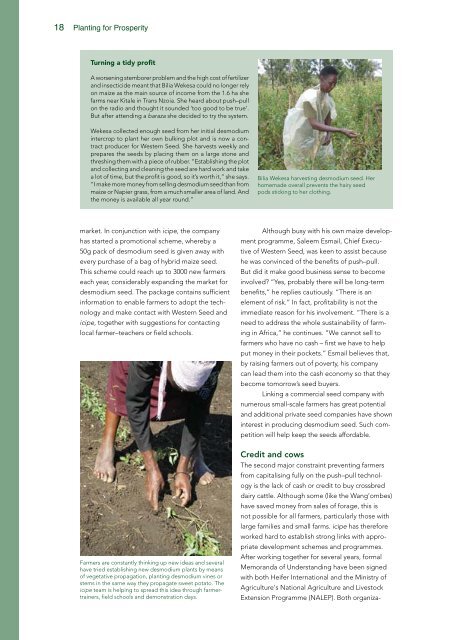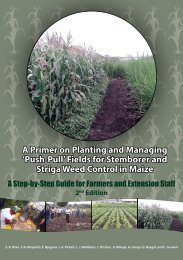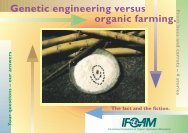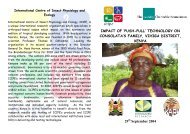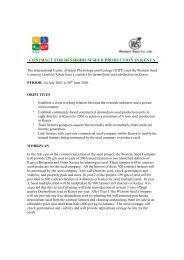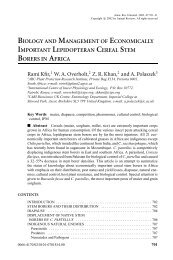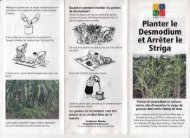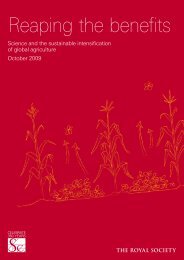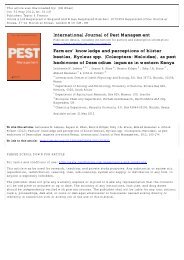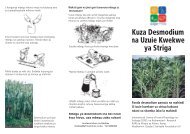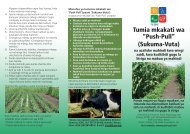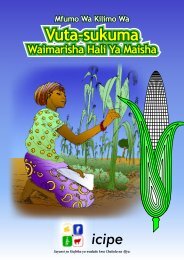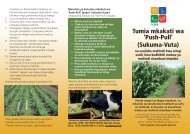a model for Africa's green revolution - Push-Pull
a model for Africa's green revolution - Push-Pull
a model for Africa's green revolution - Push-Pull
You also want an ePaper? Increase the reach of your titles
YUMPU automatically turns print PDFs into web optimized ePapers that Google loves.
18 Planting <strong>for</strong> Prosperity<br />
Turning a tidy profit<br />
A worsening stemborer problem and the high cost of fertilizer<br />
and insecticide meant that Bilia Wekesa could no longer rely<br />
on maize as the main source of income from the 1.6 ha she<br />
farms near Kitale in Trans Nzoia. She heard about push–pull<br />
on the radio and thought it sounded ‘too good to be true’.<br />
But after attending a baraza she decided to try the system.<br />
Wekesa collected enough seed from her initial desmodium<br />
intercrop to plant her own bulking plot and is now a contract<br />
producer <strong>for</strong> Western Seed. She harvests weekly and<br />
prepares the seeds by placing them on a large stone and<br />
threshing them with a piece of rubber. “Establishing the plot<br />
and collecting and cleaning the seed are hard work and take<br />
a lot of time, but the profit is good, so it’s worth it,” she says.<br />
“I make more money from selling desmodium seed than from<br />
maize or Napier grass, from a much smaller area of land. And<br />
the money is available all year round.”<br />
Bilia Wekesa harvesting desmodium seed. Her<br />
homemade overall prevents the hairy seed<br />
pods sticking to her clothing.<br />
market. In conjunction with icipe, the company<br />
has started a promotional scheme, whereby a<br />
50g pack of desmodium seed is given away with<br />
every purchase of a bag of hybrid maize seed.<br />
This scheme could reach up to 3000 new farmers<br />
each year, considerably expanding the market <strong>for</strong><br />
desmodium seed. The package contains sufficient<br />
in<strong>for</strong>mation to enable farmers to adopt the technology<br />
and make contact with Western Seed and<br />
icipe, together with suggestions <strong>for</strong> contacting<br />
local farmer–teachers or field schools.<br />
Although busy with his own maize development<br />
programme, Saleem Esmail, Chief Executive<br />
of Western Seed, was keen to assist because<br />
he was convinced of the benefits of push–pull.<br />
But did it make good business sense to become<br />
involved “Yes, probably there will be long-term<br />
benefits,” he replies cautiously. “There is an<br />
element of risk.” In fact, profitability is not the<br />
immediate reason <strong>for</strong> his involvement. “There is a<br />
need to address the whole sustainability of farming<br />
in Africa,” he continues. “We cannot sell to<br />
farmers who have no cash – first we have to help<br />
put money in their pockets.” Esmail believes that,<br />
by raising farmers out of poverty, his company<br />
can lead them into the cash economy so that they<br />
become tomorrow’s seed buyers.<br />
Linking a commercial seed company with<br />
numerous small-scale farmers has great potential<br />
and additional private seed companies have shown<br />
interest in producing desmodium seed. Such competition<br />
will help keep the seeds af<strong>for</strong>dable.<br />
Farmers are constantly thinking up new ideas and several<br />
have tried establishing new desmodium plants by means<br />
of vegetative propagation, planting desmodium vines or<br />
stems in the same way they propagate sweet potato. The<br />
icipe team is helping to spread this idea through farmertrainers,<br />
field schools and demonstration days.<br />
Credit and cows<br />
The second major constraint preventing farmers<br />
from capitalising fully on the push–pull technology<br />
is the lack of cash or credit to buy crossbred<br />
dairy cattle. Although some (like the Wang’ombes)<br />
have saved money from sales of <strong>for</strong>age, this is<br />
not possible <strong>for</strong> all farmers, particularly those with<br />
large families and small farms. icipe has there<strong>for</strong>e<br />
worked hard to establish strong links with appropriate<br />
development schemes and programmes.<br />
After working together <strong>for</strong> several years, <strong>for</strong>mal<br />
Memoranda of Understanding have been signed<br />
with both Heifer International and the Ministry of<br />
Agriculture's National Agriculture and Livestock<br />
Extension Programme (NALEP). Both organiza-


